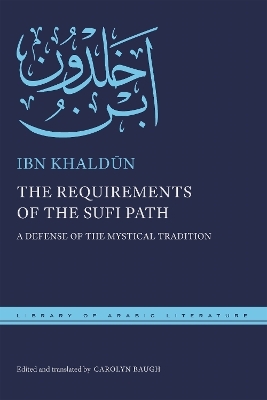
The Requirements of the Sufi Path
A Defense of the Mystical Tradition
Seiten
2022
New York University Press (Verlag)
978-1-4798-0633-1 (ISBN)
New York University Press (Verlag)
978-1-4798-0633-1 (ISBN)
Sufism through the eyes of a legal scholar
In The Requirements of the Sufi Path, the renowned North African historian and jurist Ibn Khaldūn applies his analytical powers to Sufism, which he deems a bona fide form of Islamic piety. Ibn Khaldūn is widely known for his groundbreaking work as a sociologist and historian, in particular for the Muqaddimah, the introduction to his massive universal history. In The Requirements of the Sufi Path, he writes from the perspective of an Islamic jurist and legal scholar. He characterizes Sufism and the stages along the Sufi path and takes up the question of the need for a guide along that path. In doing so, he relies on the works of influential Sufi scholars, including al-Qushayrī, al-Ghazālī, and Ibn al-Khaṭīb. Even as Ibn Khaldūn warns of the extremes to which some Sufis go—including practicing magic—his work is essentially a legal opinion, a fatwa, asserting the inherent validity of the Sufi path.
The Requirements of the Sufi Path incorporates the wisdom of three of Sufism’s greatest voices as well as Ibn Khaldūn’s own insights, acquired through his intellectual encounters with Sufism and his broad legal expertise. All this he brings to bear on the debate over Sufi practices in a remarkable work of synthesis and analysis.
A bilingual Arabic-English edition.
In The Requirements of the Sufi Path, the renowned North African historian and jurist Ibn Khaldūn applies his analytical powers to Sufism, which he deems a bona fide form of Islamic piety. Ibn Khaldūn is widely known for his groundbreaking work as a sociologist and historian, in particular for the Muqaddimah, the introduction to his massive universal history. In The Requirements of the Sufi Path, he writes from the perspective of an Islamic jurist and legal scholar. He characterizes Sufism and the stages along the Sufi path and takes up the question of the need for a guide along that path. In doing so, he relies on the works of influential Sufi scholars, including al-Qushayrī, al-Ghazālī, and Ibn al-Khaṭīb. Even as Ibn Khaldūn warns of the extremes to which some Sufis go—including practicing magic—his work is essentially a legal opinion, a fatwa, asserting the inherent validity of the Sufi path.
The Requirements of the Sufi Path incorporates the wisdom of three of Sufism’s greatest voices as well as Ibn Khaldūn’s own insights, acquired through his intellectual encounters with Sufism and his broad legal expertise. All this he brings to bear on the debate over Sufi practices in a remarkable work of synthesis and analysis.
A bilingual Arabic-English edition.
Ibn Khaldūn (Author) Ibn Khaldūn (d. 808/1406) was a Tunisian-born scholar, jurist, sociologist, and historian, best known for his influential work on history, The Book of Lessons (Kitāb al-ʿIbar), and the prolegomenon to that work, the Muqaddimah. Carolyn Baugh (Edited and Translated by) Carolyn Baugh is Associate Professor of History and Arabic at Gannon University in Erie, Pennsylvania, where she teaches courses in Middle East and world history and also directs the Women’s Studies program.
| Erscheinungsdatum | 06.10.2022 |
|---|---|
| Reihe/Serie | Library of Arabic Literature |
| Übersetzer | Carolyn Baugh |
| Verlagsort | New York |
| Sprache | englisch |
| Maße | 152 x 229 mm |
| Gewicht | 590 g |
| Themenwelt | Literatur ► Anthologien |
| Geisteswissenschaften ► Religion / Theologie ► Islam | |
| ISBN-10 | 1-4798-0633-1 / 1479806331 |
| ISBN-13 | 978-1-4798-0633-1 / 9781479806331 |
| Zustand | Neuware |
| Haben Sie eine Frage zum Produkt? |
Mehr entdecken
aus dem Bereich
aus dem Bereich


